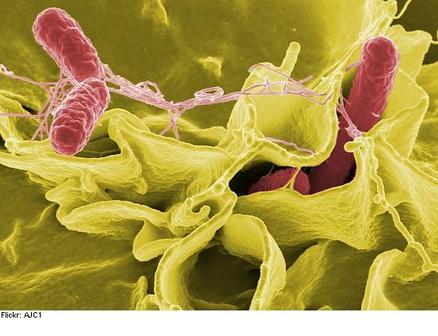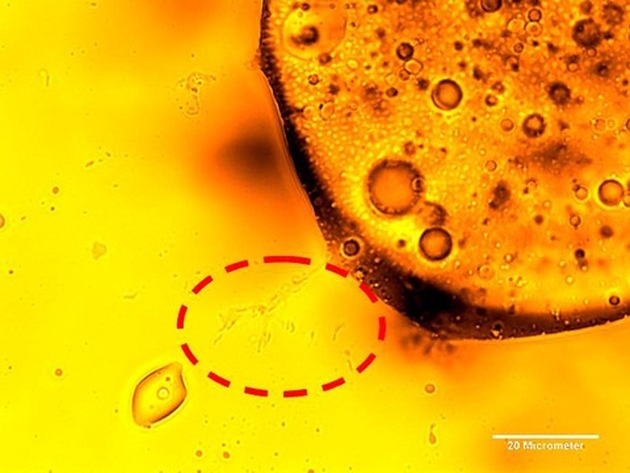 By Dan Vergano, USA TODAY & By: Lea Winerman , PBS News Deep sea bacteria completely devoured much of the natural gas released in the Gulf of Mexico oil spill, a scientific team concluded Thursday. The findings help build the case that ocean bottom bugs are a natural biofilter that regularly dine on natural seeps of methane, or natural gas, and related chemicals worldwide. Methane was the most abundant component of the summer oil spill. About 220,000 tons was released from April to July. The finding adds to evidence that deepwater microbes also consumed other "light" crude oil constituents, such as propane and ethanol, released in the spill. "We expected the methane to persist longer," says study co-author David Valentine of the University of California, Santa Barbara, based on June estimates. By September, he says, "the complete consumption of methane came as a surprise." Measures suggest only 0.01% of the methane released in the spill still lingered at depth. Intense water pressure and cold temperatures at the spill site, 5,000 feet deep, kept much of the methane trapped in underwater layers, where the microbes could feast on the gas, instead of allowing it to bubble to the surface. Study samples found that deep water layers formerly laced with methane were filled with evidence of methane-eating bacteria populations that had grown "exponentially" over the summer. The results suggest "bacterial communities may act as a dynamic biofilter that responds rapidly to large-scale (natural gas) inputs into the deep ocean," the study says. "The Gulf of Mexico has more (oil and natural gas) seeps than practically anywhere in the world, and the microbes there were likely primed to grow there," says microbiologist Terry Hazen of the Energy Department's Lawrence Berkeley (Calif.) National Laboratory, who was not part of the study. The study results match unpublished microbe measures made by his team this fall, Hazen adds. The study results come a day after a presidential commission investigating the Deepwater Horizon spill found safety concerns with oil industry deep sea drilling, now contemplated everywhere from the Arctic and off the coast of Brazil. GREEN HOUSE BLOG: Panel warns Gulf oil spill could happen again Future deep-sea oil spills "will at least partially be met with a microbial fate," based on the findings, says study lead author John Kessler of Texas A&M University, by e-mail. Federal scientists in November estimated that about 13% of the 4.9 million barrels of oil spilled into the Gulf from the 84-day-spill was consumed by microbes.
Along the Gulf of Mexico, oil spill tar balls are still washing ashore. For example, this is happening at Alabama's Fort Morgan beach, where BP crews returned from a holiday break Monday to resume cleanup work. "I don't want to give the impression that the spill wasn't an ecological disaster. It was," Hazen says, noting concerns about dioxin-related chemicals, still unaccounted for, that were released in the disaster. "But a lot of the dangerous constituents of the oil we can broadly suspect of going away faster than many people first suggested." Oil-eating bacteria proliferated below the surface of the Gulf of Mexico this summer, helping to break down and clean up an underwater oil plume that stretched miles from the Deepwater Horizon wellhead, according to a study released Tuesday by the journal Science. The study is the latest update in the ongoing debate over what has happened to the bulk of the 4.9 million barrels of oil that spilled from the well, and it suggests that the oil may be disappearing relatively quickly from the deep-sea environment. Just last week, researchers at Woods Hole Oceanographic Institution confirmed that much of the oil from the spill ended up suspended in a deep-sea cloud near the wellhead, rather than floating to the surface of the water. They released the most precise map yet of a 1.2-mile-wide plume of microscopic oil compounds that floated 3,000 feet below the surface of the water. But the map was based on data taken in June, before the well was capped. It didn't address what has happened to that underwater oil since the leak stopped, and how much now remains in the ocean. Oil-eating microbes are plentiful in the Gulf of Mexico, helping to break down oil from natural seeps. But no one is sure how fast that breakdown is occurring with the unprecedented amount of oil deep underwater in the Gulf, where the cold temperatures -- about 5 degrees Celsius -- could slow down the process. In Tuesday's study, microbiologist Terry Hazen and his colleagues at Lawrence Berkeley National Laboratory looked at the amounts and types of bacteria in the oil plume at the end of May and beginning of June. They found that a type of oil-eating bacteria adapted to the cold water was twice as plentiful inside the oil plume as outside, and that these bacteria -- a newly-discovered species related to the Oceanospirillales -- made up 90 percent of all the bacteria in the oil plume. The researchers also found DNA and fatty acids in the water that are signs of oil breaking down. They also found that the bacteria were breaking down the oil without depleting the oxygen level in the water as much as expected. That's an important wrinkle, because last week's study by the Woods Hole researchers found that the oxygen supply in the plume water remained high, avoiding the feared deoxygenated "dead zone" harmful to plants and animals. But the new study suggests that despite the fact that oxygen levels remained high in the water, the bacteria were still hard at work. "The findings are consistent with each other -- which I think is pretty neat to see," says Richard Camilli, a researcher at Woods Hole Oceanographic Institution and the lead author of last week's study. The new evidence of oil-eating bacteria in the plume adds to the ongoing debate over how fast the deep-sea oil is disappearing. The federal government said earlier this month that such deepwater dispersed oil was biodegrading quickly, and that 75 percent of the spilled oil had been accounted for. Some outside researchers, however, have questioned that conclusion, arguing that the oil is biodegrading more slowly than the government scientists assume. Tuesday's study seems to offer some support for the government's findings. In fact, Hazen says that he and his team have continued their monitoring throughout the summer, and that as of about three weeks ago the oil plume was no longer detectable. "We've been out there continuously," he says. "Once the oil flow stopped on July 15, within two weeks we saw most of the plume disappear." Ian MacDonald, an oceanographer at Florida State University, says that the new study is good news. "It certainly shows that the microbial community can and is responding to this addition of oil to the deep water," he says. However, he cautions that many questions remain unanswered -- such as what has happened to the methane released into the water along with the oil, what percentage of the total oil released ended up in this deep-sea plume, and the environmental effects of changing the deep-sea microbial community. Original Articles: 1) http://www.usatoday.com/tech/science/environment/2011-01-06-gulf-oil-spill-methane-natural-gas-bacteria_N.htm 2) http://www.pbs.org/newshour/rundown/2010/08/study-oil-eating-microbes-plentiful-in-gulf-oil-spill.html
0 Comments
Your comment will be posted after it is approved.
Leave a Reply. |
News Watch
Mind-opening news articles, editorials, videos & apparel that inspire our readers and help liberate them from the status quo. Stay informed.
Write For UsSpace WatchTop NewsNews Watch Categories
All
|
|
|
HAVE A TIP OR STORY TO TELL? JOIN TODAY & SHARE YOUR STORY!
If you have a breaking news tip or idea, please email: [email protected] Apparently Apparel® is a registered trade name and part of the ZOAT International® brands network. © 2007-2023. All Rights Reserved. Privacy Policy. All art & news content posted on this site is commentary or opinion and is protected under Free Speech. ApparentlyApparel.com is not responsible for content written by contributing artists, authors or news feeds. The information on this site is provided for educational and entertainment purposes only. It is not intended as a substitute for professional advice of any kind. ApparentlyApparel.com assumes no responsibility for the use or misuse of this material.
|
|







